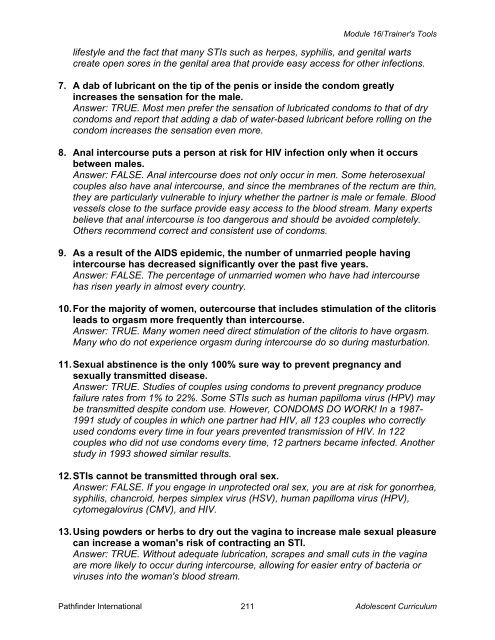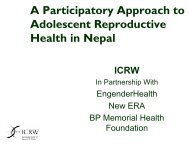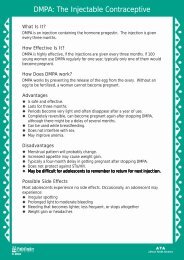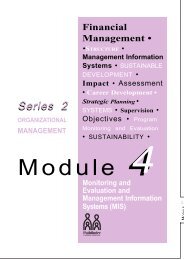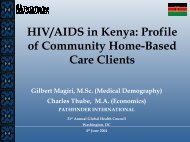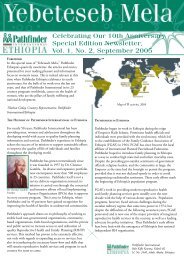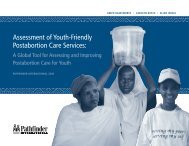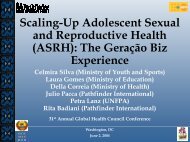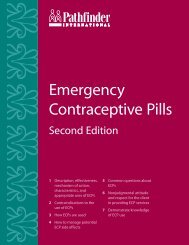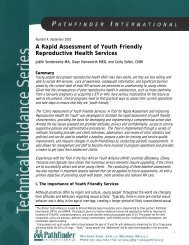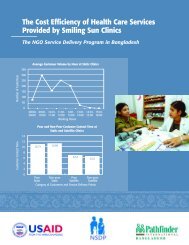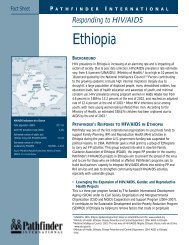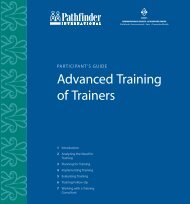reproductive health services for adolescents - Pathfinder International
reproductive health services for adolescents - Pathfinder International
reproductive health services for adolescents - Pathfinder International
You also want an ePaper? Increase the reach of your titles
YUMPU automatically turns print PDFs into web optimized ePapers that Google loves.
Module 16/Trainer's Tools<br />
lifestyle and the fact that many STIs such as herpes, syphilis, and genital warts<br />
create open sores in the genital area that provide easy access <strong>for</strong> other infections.<br />
7. A dab of lubricant on the tip of the penis or inside the condom greatly<br />
increases the sensation <strong>for</strong> the male.<br />
Answer: TRUE. Most men prefer the sensation of lubricated condoms to that of dry<br />
condoms and report that adding a dab of water-based lubricant be<strong>for</strong>e rolling on the<br />
condom increases the sensation even more.<br />
8. Anal intercourse puts a person at risk <strong>for</strong> HIV infection only when it occurs<br />
between males.<br />
Answer: FALSE. Anal intercourse does not only occur in men. Some heterosexual<br />
couples also have anal intercourse, and since the membranes of the rectum are thin,<br />
they are particularly vulnerable to injury whether the partner is male or female. Blood<br />
vessels close to the surface provide easy access to the blood stream. Many experts<br />
believe that anal intercourse is too dangerous and should be avoided completely.<br />
Others recommend correct and consistent use of condoms.<br />
9. As a result of the AIDS epidemic, the number of unmarried people having<br />
intercourse has decreased significantly over the past five years.<br />
Answer: FALSE. The percentage of unmarried women who have had intercourse<br />
has risen yearly in almost every country.<br />
10. For the majority of women, outercourse that includes stimulation of the clitoris<br />
leads to orgasm more frequently than intercourse.<br />
Answer: TRUE. Many women need direct stimulation of the clitoris to have orgasm.<br />
Many who do not experience orgasm during intercourse do so during masturbation.<br />
11. Sexual abstinence is the only 100% sure way to prevent pregnancy and<br />
sexually transmitted disease.<br />
Answer: TRUE. Studies of couples using condoms to prevent pregnancy produce<br />
failure rates from 1% to 22%. Some STIs such as human papilloma virus (HPV) may<br />
be transmitted despite condom use. However, CONDOMS DO WORK! In a 1987-<br />
1991 study of couples in which one partner had HIV, all 123 couples who correctly<br />
used condoms every time in four years prevented transmission of HIV. In 122<br />
couples who did not use condoms every time, 12 partners became infected. Another<br />
study in 1993 showed similar results.<br />
12. STIs cannot be transmitted through oral sex.<br />
Answer: FALSE. If you engage in unprotected oral sex, you are at risk <strong>for</strong> gonorrhea,<br />
syphilis, chancroid, herpes simplex virus (HSV), human papilloma virus (HPV),<br />
cytomegalovirus (CMV), and HIV.<br />
13. Using powders or herbs to dry out the vagina to increase male sexual pleasure<br />
can increase a woman's risk of contracting an STI.<br />
Answer: TRUE. Without adequate lubrication, scrapes and small cuts in the vagina<br />
are more likely to occur during intercourse, allowing <strong>for</strong> easier entry of bacteria or<br />
viruses into the woman's blood stream.<br />
<strong>Pathfinder</strong> <strong>International</strong><br />
211<br />
Adolescent Curriculum


